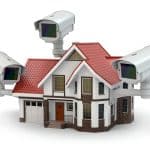Making The Right Choice
Your home alarm system can be a vital part of your security setup. Whether you own or rent a home your expect you and your family to be safe. If your at work or traveling it is good peace of mind knowing your home is armed and protected. Burglaries and theft are forever present and whether it you have experienced this yet or not statistically it is only a matter of time before something happens, your house is generally the biggest investment you will make in life and it makes sense to protect it against unwanted guests. A typical home alarm system consists of door sensors, motion sensors, internal & external sirens, keypad and a security panel, you can also choose to have more sensors such as glass breaks, outdoor beams, curtain sensors, roller door senors and more, providing you with complete systems to make your life easier and safer.
Basic alarms can be as small as 1 or 2 motion detectors connected up to and internal and external siren, right through to a premise which has sensors on all windows and entry points which can be armed in stay mode, movement within the house is not detected but entry through the perimeter is detected. This is why it is important to consider all of the options when you thinking about purchased a burglar alarm system.
Alarm System Installation Considerations
Types of alarm systems
There are many important considerations to keep in mind when choosing home alarm systems. Starting with what type of home or business alarm system suits your requirements, with a huge variety of alarm system types from hard-wired, wireless 433mhz or wireless ZigBee or zwave systems each having there own set of pros and cons. Hard-wired systems require no batteries to replace over time but are generally more labour intensive during the installation, if you have a house which is double storey or no ceiling access to run cables a hard-wired alarm may not be an option for you. Wireless systems are generally cheaper and less labour intensive for the initial installation but require more frequent servicing than hard-wired alarms through battery changes and potential interference through nearby devices operating on the same frequencies.
Monitoring options
When you are away from your house and your alarm is activated it is nice to be notified rather than relying on neighbours or someone down the road hearing your siren and phoning you, this is where you can choose to have your security alarm system professionally monitored by a security control room, these control rooms are manned 24/7 and the staff are ready to either contact your specified callout list, call the police or dispatch a security guard to site, all within a matter of seconds. Professional monitoring generally incurs a monthly fee for the service provided. Alternatively to professional monitoring systems can be designed so you receive and automated text message notifying you of which sensor on your alarm system has been activated, this service also requires months costings as it requires an active mobile sim card. If you are looking for a monitoring solution which does not require monthly ongoing fees you can look for a manufacturer which offers a IP module with there system with app control and no monthly fees, this is becoming more and more popular as the IOT world expands more and more online services are becoming available.
System design and capabilities
If you jump into installing an alarm system without considering things like panel input capacity you may regret it as adding more sensors down the track could require another panel upgrade. This is why it is important to select an alarm system with the correct amount of zones, a good idea is to count all the doors and windows in the house then add 5 to allow for maximum sensors. Other initial considerations to be made are as follows.
- Do you want remotes to arm and disarm your alarm (some remotes can be used as personal panic alarms)
- Does your system support IP modules and push notifications
- If Choosing wireless how reliable is the manufacturers wireless equipment
- If choosing wireless does your manufacturer have the right wireless detectors to suit your requirements
- What are the warranties provided by the manufacturer
- Can you integrate CCTV into the alarm system
- Does the system support home energy management
The Differences Between Residential & Business Alarms
The purpose of residential and business alarm systems cast differ vastly depending on how large the business is and what field the business in in. If the business is in the banking sector, if will generally require multiple levels of detection from magnetic reed switches, Passive infrared detection right through to safe seismic sensors, this means it is always best when choosing a business security systems to have it tailored to your business’s requirements.
If you’re considering installing an alarm system for your home or business, get expert advice and contact Rapid Alarms today!






